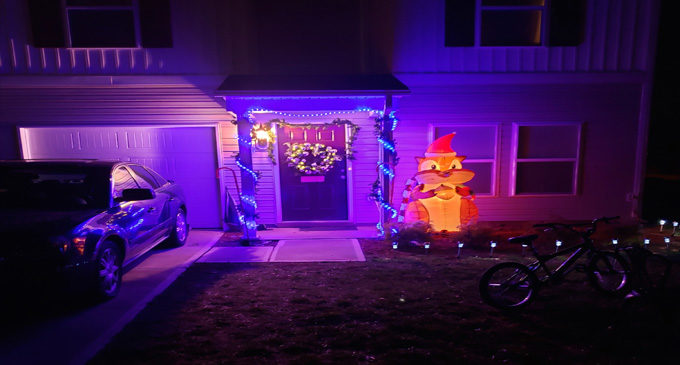Woman helps clients achieve dream of home ownership

By John Railey
In almost 20 years of working for the county of Forsyth, almost 15 of those as the loan officer for county’s Homeownership Program, Bianca Green has helped hundreds of local residents buy their homes, often their first ones. Most of her clients work, some more than one job, so she often meets with them on evenings and weekends. Green, also a licensed real-estate broker, guides them through the complex home-buying process, beginning with financial-literacy classes and ending with the life-changing purchases of homes.
“She was there with me from beginning to end, right through the closing,” Arteria Logan of Winston-Salem said of Green.
Logan spent most of her life in apartments before buying her first home last year. This holiday season marks the second in the home for her and her family, a dream come true. Green makes those dreams happen year ’round for her clients, always getting a thrill from closings. “Green said, “For the majority of the folks I work with, this program is the only way,” Green said. She, like many of her clients, grew up in modest means and has worked hard on her own dreams, including recently buying the house in which she grew up in northeast Winston-Salem. Her life, like those of her clients, has had its share of challenges and twists.
Green is the linchpin of the county program, which promotes homeownership among low- to moderate-income residents by subsidizing down payments for qualified homebuyers, mainly first-time ones, and comes under the Forsyth County Community and Economic Development department. Dan Kornelis, the department director, has said Green “is awesome. She’s what makes it work. She lives and breathes the program, working with clients evenings and weekends to suit their schedules.”
Winston-Salem State University’s Center for the Study of Economic Mobility (CSEM) and the county of Forsyth have come together to study the program. Since 2004, more than 600 participants have been through it. In interviews with CSEM, participants have credited the program with increasing their economic mobility. The program (https://www.co.forsyth.nc.us/Housing/assets/documents/AHOP_HOME.pdf) gives its participants a well-earned jumpstart to the middle-class.
The program is funded federally through the county, state and local organizations to participants who put up about $1,000 each of their own money toward downpayments. Kornelis, the department director, who played the key role in starting the program in 1994, welcomes the CSEM study.
Kornelis noted that CSEM’s research program “includes the effect of homeownership on the families’ ability to create wealth; the difference in home appreciation dependent on location and the date of purchase; and if racial and economic diversity of neighborhoods affect the increase/decrease of properties over time.”
Craig Richardson, the CSEM director, said, “The program is a potentially powerful opportunity for low-income residents to climb the socioeconomic ladder through two vectors: first, the purchase of a house may allow for wealth to build; second, the program allows residents to move to their most favored location within the county, thus giving them better choices around neighborhoods, schools, access to jobs, retail shops and health care,” Richardson said. “Our research will for the first time give an empirical measure of the return on investment from this decades old program.”
Initial findings from CSEM’s internal research show that for every $1 spent assisting these homeowners through this program, they accumulated $9.56 in net worth. The average accumulated equity for the 508 participants in CSEM’s study sample is $34,289 after an average of nine years in the program, or $3,810 in net wealth accumulated per year. Those 508 participants have also paid $6,225,641 in property taxes since acquiring their homes. **
Green is 51. She is one of four children. Her father, a retired Army veteran, was a janitorial manager for a medical park in the city. Her mother taught kindergarten and drove a school bus. “We were working poor,” Green said. “But I didn’t know that because I was the baby. Usually, if I asked for something, my dad found a way to get it.”
Three months after graduating from Reynolds High School, Green had a child. She went to Forsyth Technical Community College by day, working as a librarian by night in the radiology lab at what is now known as Wake Forest Baptist Medical Center to pay her tuition. She wanted to become a computer engineer. Her parents and other family members helped her with childcare. But by the late 1980s, after about two years of ’round the clock studying and working, Green said, “I got burned out.” She took a break from school, continuing to work at the hospital.
Her father’s health declined. He talked with Green about her education, telling her, “You need to finish what you started. Promise me when you go back, you’ll finish.” Bianca made the promise.
In 1991, she got a got a call from a friend at Salem College, which was recruiting minority students. Green enrolled, studying biology and chemistry, with dreams of becoming a doctor. She found, however, that she didn’t like the lab or morgue parts of that plan. She talked to an advisor and changed her major to psychology. “It was a trying time,” Green said. “My car died, so I started taking the bus to school, catching the 6:15 a.m. bus for my first my first class at 8. The bus arrived downtown around 6:30. But the trolley that went through Old Salem did not start running until 9, which meant I had to walk from downtown to Old Salem to be in class at 8. Some of those days, I was like, ‘This for the birds.’ I would cry. But as my dad would say, ‘That which does not kill you makes you stronger.’”
She graduated and went to work for Forsyth County Department of Social Services in intake, making the first contact with clients and connecting them with services such as Medicaid and financial assistance. She learned rudimentary Spanish, developing a rapport with Latinx clients, helping many at the former Reynolds Health Center, and subsequently becoming the supervisor of a unit providing Medicaid, cash and daycare assistance.
She loved the work. “I always wanted to help people,” she said.
Green later took a job at Experiment in Self-Reliance, a local nonprofit, helping clients purchase homes through the Individual Development Account, or IDA, program. She referred clients to the county’s homeownership program, and became familiar with its processes. When the loan officer job opened, she applied and was hired.
Often, she said, her clients are “the first ones in their family to become a homeowner. For me, this is priceless. Single mothers, single fathers, young couples, mature ones and folks in their 60s. The biggest part I do is be a supporter/cheerleader. I help them discover their self-worth. I tell them, ‘You’re the first asset. You matter.
Your role in becoming a homeowner matters. Don’t listen to the naysayers. You’re responsible. You show that every day with your kids.’”
Green does most of the program’s work and sees all its clients, dealing with more than 60 clients a years and closing an average of 30 homes a year. One of those clients, whom she met last fall, was Arteria Logan.**
Logan is 47. She heard about the county program through the Center for Home Ownership, a nonprofit that counsels first-time buyers. At the center, she learned how to set a budget and raise her credit score. The center referred her to Green. “She made you feel warm and welcome and she was easy to talk to,” Logan said.
Logan told Green about her life, growing up in northern Winston-Salem, mostly in apartments. “I’m an only child,” Logan said. “It was just me and my mom. She did the best she could. At times she was on public assistance, but most of the time she would work in nursing homes as a certified nursing assistant. Logan, a Carver High School graduate, has held her secretarial job at the hospital for 20 years.
For a while, Logan said, her mother had a house, but was unable to keep up the payments. Several years ago, she said, she and her ex-husband had tried to buy a house, but the deal fell through at the end because of problems with their credit, so Logan worried her new push to buy a house would fall through as well. “I didn’t want my feelings to be hurt again, that’s how I was going into it,” she said.
Green put her at ease. “She told me what I needed to do, walking me through the loan- and home-buying process, putting me in touch with the people I needed to be in contact with to get things done. She is really caring and really puts in the effort,” Logan said.
She signed up for the county program. She took two required seminars, one that explained the program and its processes, and the other that explained how to do maintenance checks on your house.
Logan’s Realtor called her and told her about some new construction in northern Winston-Salem on Beck Lane, giving her a lot number. “I would go out there about three times a week, just looking and fantasizing about owning that house that was going up,” Logan said. She continued to talk to Green.
Green said: “We’re passionate about what we do. We are their cheerleader, their accountability partner. We hold them accountable. We will be there every step of the way with them.”
Logan decided to make an offer on the Beck Lane house, which has three bedrooms and two-and-a-half baths over two stories. She got the house for $143,000, and received $28,000 from the program for her down payment. She put up $700 of her own money toward the down payment. For the most part, interest is not charged on loans through the program, and that’s the case with Logan’s. She said her mortgage payments are $859 monthly. “I should have done this long before,” she said.
Those figures are in sync with the program. The average house cost for clients is $149,000 to $190,000, Green said. Clients are encouraged to put up $1,000 of their own money for down payments. The geography and demographics are in sync as well. Most of the program’s clients are in the northern and southern parts of the city and in Rural Hall, Green said. About 90% of the clients are Black, as many as 8% are Latino, and about 2% are white. Many whites, Green indicated, are well-resourced and “have options” beyond the county program.
Logan’s mother came to the Nov. 7, 2019 closing, as did Green. They were both as excited as Logan. She lives in the house with two of her grown children – a youngest son and a daughter – and a grandchild. Homeownership has changed her life.
“I learned about yard work and things of that nature,” she said. “Everything was just like a fun first to me. Owning your own home changes you as a person and how you deal with things financially. I was pretty responsible, but it made me more responsible, being careful with my money and what I spent it on.”
She has recommended the county program to others, including a co-worker who purchased a home through the program soon after she did.
“I needed something to leave my kids if something should happened to me, I just wanted them to have it, to know they’d always have somewhere to live. Take that worry off the plate. The whole thing was about my kids, I just wanted to leave them something, wealth building, and also to set an example for them. Even though I’m 47, it’s never too late to achieve a goal, and this one I wanted to achieve, needed to achieve.”
Green said, “I love the impact that buying a home has on people’s lives. It’s amazing.”
John Railey, raileyjb@gmail.com, is the writer-in-residence for CSEM. For more information, visit www.wssu.edu/csem.









